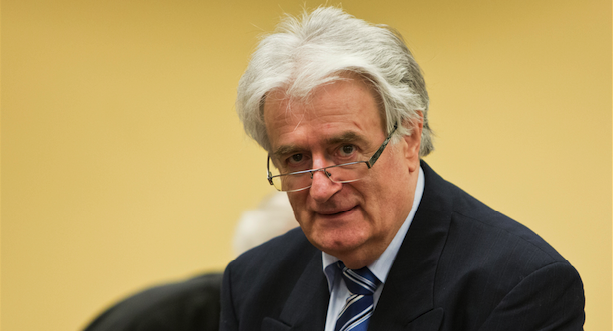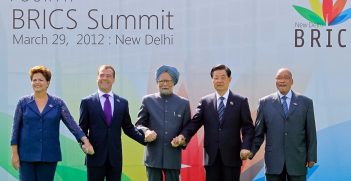What the Karadžić Verdict Means for International Law and the Bosnian Conflict

Radovan Karadžić was sentenced on 24 March to 40 years in prison, proving that even the highest-ranking officials are not immune from prosecution.
Radovan Karadžić, the former president of the Bosnian Serb Republic and supreme commander of its armed forces during the 1992-95 war, was convicted Thursday of genocide, war crimes and crimes against humanity by the International Criminal Tribunal for the Former Yugoslavia (ICTY), the United Nations war crimes court in The Hague. The 70-year-old received 40 years in prison — a de facto life sentence (although there will be an appeal).
The verdict, grandly dubbed the biggest moment in international justice since Nuremberg, quickly made headlines across the world. The tribunal has already ruled that Bosnian Serb forces committed genocide in Srebrenica in July 1995, when 8,000 Bosniak men and boys — “every able-bodied male” — were killed in the space of a few days, and their bodies bulldozed in pits. Karadžić had earlier admitted that the slaughter of detainees occurred but denied issuing orders or even awareness of it.
Wrong, says Thursday’s verdict. Karadžić “significantly contributed.” Given that this part of the verdict is unlikely to be modified on appeal, the ICTY has therefore made yet another important step in defining the character of the event described as the worst crime in post-World War II European history (also: one of the greatest failures of United Nations peacekeeping ever, considering that 600 locally stationed peacekeepers utterly failed to prevent it). Furthermore, Karadžić’s Srebrenica verdict directly informs the ongoing trial of the Bosnian Serb general Ratko Mladić, the court’s last high-profile defendant, which will shed even brighter light on the chain of decisions that led to the genocide.
Karadžić was found guilty on nine other counts — five counts of crimes against humanity and four counts of violations against the laws and customs of war. To the dismay of thousands of his victims, however, he was cleared of the second genocide charge relating to atrocities that occurred in 1992 in seven Bosnian municipalities, from Foča in the southeast to Prijedor in the northwest. Here, the court found Karadžić guilty for being part of a joint ethnic cleansing enterprise but rejected the prosecution’s case that he also had “genocidal intent to destroy a group.”
This is the most controversial part of the verdict. For one, in the absurd world of Bosnia’s politics, the notion that a single genocide occurred in Srebrenica and all the rest was ‘mere’ mass murder, torture, terrorism, displacement of two million people from their homes and so on can and will now be used to undermine the position of those who view the Serb Republic as an abomination and call for its abolishment — from Bosniak politicians to Angelina Jolie. This may be seen as rhetorical, but local ethnocrats thrive on precisely such rhetorical jousts — the postwar, a.k.a. ‘Dayton’ Bosnia-Herzegovina is in fact predicated upon them.
Like all the verdicts before it, the Karadžić verdict brings the mandate, necessity and the legacy of the ICTY into sharp focus. On the plus side, the tribunal has helped communities from being pegged as ‘collectively responsible’ and sent a message that international justice can be meted out relatively efficiently as well as impartially. Equally importantly, as the chief prosecutor Serge Brammertz recently argued, the tribunal has also proven that even the highest-ranking state officials are no longer immune from prosecution. Syria’s Assad was probably paying extra attention to world news Thursday.
On the minus side, there have been numerous questions about the tribunal’s transparency, operating procedures and professional standards more generally. The fact that the ICTY moved to arrest Florence Hartmann, its former spokeswoman and a subsequent harsh critic, just hours before the Karadžić verdict will almost certainly underscore some of them in the coming days.
There is one more thing: the tribunal has too often hyped itself up as the conflict’s official historian and an agent of ‘reconciliation.’ This was a strategic mistake. Investigations, prosecutions, appeals and other legal activities, even when well-designed and well-executed, address, by default, only the crimes of individuals or small groups of individuals — not ‘history,’ not ‘peace.’ Counterfactually speaking, even if these loftier ICTY aims had been bolstered by years of domestic trials, official apologies, truth commissions, media and education reform, and reparations across the Yugosphere, there still would be nothing to guarantee an improvement in mutual understanding, much less trust, between and among its many ethnonational communities. Some societies and some spaces manage to glue themselves together after vicious wars, but this typically requires a multigenerational effort, transformational leadership and a great deal of luck.
Srdjan Vucetic is an assistant professor in the Graduate School of Public and International Affairs at the University of Ottawa. This article originally appeared on Open Canada on 24 March. It is republished with permission.





